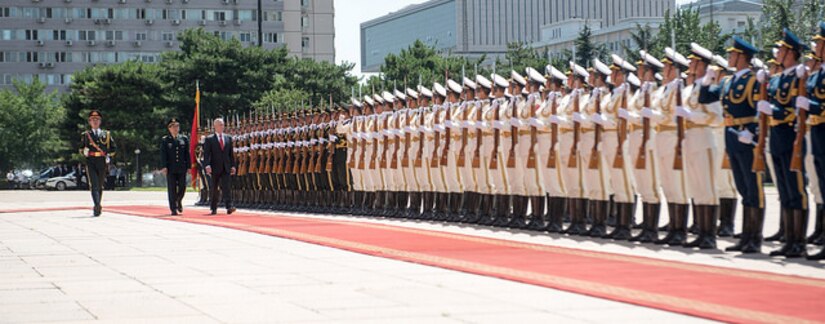By Jim Garamone, DoD News, Defense Media Activity
WASHINGTON -- Defense Secretary James N. Mattis has just
returned from a trip to China, South Korea and Japan and is immediately
immersing himself in preparations for attending the NATO Summit in Brussels
next week, a Pentagon spokesman told reporters today.
The secretary will advise President Donald J. Trump during
the summit. Mattis will then travel to Croatia and Norway, Army Col. Rob
Manning said during a weekly gaggle with reporters.
The secretary has visited the Indo-Pacific region seven
times during his tenure. During his latest visit, he stressed the need for
“strategic transparency” with Chinese leaders. “The leaders discussed a broad
range of defense issues and the importance of substantive military-to-military
contacts to reduce risk and strategic uncertainty,” the colonel said.
Mattis and Chinese leaders also reaffirmed the need for the
complete, verifiable and complete denuclearization of the Korean Peninsula,
Manning said. During his meetings, Mattis also stressed the United States would
continue to sail and fly wherever international rules allow.
Following his trip to Beijing, the secretary journeyed to
Seoul and Tokyo to brief South Korean and Japanese leaders on the discussions.
Turkey’s Joint Strike Fighters
Manning also discussed Turkey’s two F-35 Lightning IIs,
which have arrived at Luke Air Force Base, Arizona. “Turkish F-35 pilots and
maintainers have already arrived at Luke and will begin flight academics soon,”
he said. “Following established agreements, the U.S. government maintains
custody of the aircraft until custody is transferred to the partner.”
This normally occurs after partner training is complete,
which takes about one to two years, he said. “The U.S. government has not made
a determination on Turkey’s future participation in the F-35 Joint Strike
Fighter Program,” Manning said.
Turkey is a close and valued NATO ally and has been involved
with the F-35 program since it was first announced in 2002.
Manning also discussed U.S. troop levels in Germany. He said
the National Security Council did not request a cost analysis of the presence
of U.S. forces in Germany.
“But we regularly review our force posture and we provide a
cost-benefit analysis to make sure we have the right forces in the right places
with the right capabilities,” Manning said. “That’s a constant process across
DoD’s global footprint.”







No comments:
Post a Comment